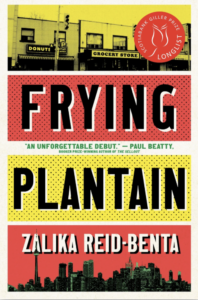
Youth Culture’s Celebrate Diversity and Inclusion Book Club kicked off last month with its first release: Frying Plantain by Zalika Reid-Benta.
Book Review by Kamaldeep Dhillon
The complexities of the immigrant experience are often shadowed by one’s innate desire to belong. In Zalika Reid-Benta’s novel, Frying Plantain, readers see this desire within the protagonist of the story, Kara. Throughout 12 interconnected short stories, readers are immersed in a coming of age experience narrated by the perspective of Kara, who is a second-generation Canadian of Jamaican descent. The novel takes place primarily in the neighbourhood of Little Jamaica, which is also known as Eglinton West, in the York district of Toronto, Ontario.
“For the first three days of my visit, they [her cousins] would at least tease me, broad smiles stretching down their cheeks…I’d fuss and grumble, piqued at the taunting but grateful for the inclusion…After, they didn’t goad me anymore and only approached me for games they thought Canadian girls could stomach.” (p. 11)
In the first short story, Pig Head, Kara struggles to connect her Jamaican identity to her Canadian identity. This theme is continuously explored throughout the rest of the novel as well. For readers, her struggles are evident because she often feels as though she must prove herself to be strong and capable in order to gain the acceptance of others. She longs to feel as though she belongs with her cousins in Jamaica, her friends in her neighbourhood, and her peers at school all for different reasons. This wanting to belong is a phenomenon shared amongst many individuals who are from immigrant families or culturally diverse. In theory, belonging is a simple idea; it is an affinity for a place or situation. However, a sense of belonging dives much deeper in that individuals are often questioning themselves by wondering who they are, where they belong, and why each identity seems to conflict in others’ minds. This is clear and Kara as she often battles with inner conflicts and struggles with the battle of being ‘not Canadian enough’ to some and ‘not Jamaican enough’ in the eyes of others. Kara has a background of rich heritage, which is interwoven with traditional Canadian culture; but despite these two strong identities, Kara does not feel a true sense of belonging in either – a shared experience among many culturally diverse individuals.
“I nod my head and tighten my grip on the No Frills bag, feeling the weight of yogurt cups, remembering the weight of all the leftovers she’d given me throughout the years. I smile slightly and turn toward the door. ‘Thank you for the food, Nana.’” (p. 558)
Despite the constant battle between two identities, Frying Plantain highlights one key message. Truthfully, Zalika Reid-Benta illustrates various important messages, but there is a particular idea that is important to remember. As we mature and learn by experience, it is crucial to recognize the importance of culture. Whether it be one culture, two cultures, or multiple cultures that are interwoven together, we can be who we choose to be. We can be the traditions we partake in, the cultural foods we consume, or the ethnic clothes we wear. We can be who we choose to be regardless of what others think or say. Kara chose to be somebody that loves champagne kola, Lord of The Rings, telling stories, and of course, fried plantain.
Find out more about the Diversity and Inclusion Book Club here.
Follow Youth Culture on Instagram to stay up to date on more book club events!



